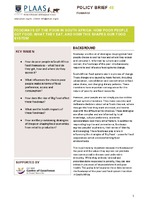Foodways of the poor in South Africa: How poor people get food, what they eat, and how this shapes our food system
Abstract
Foodways are the set of strategies shaping what food
people choose as well as how and where they access
and consume it. Informed by culture and social
context, the foodways of the poor simultaneously
respond to and influence food systems change.
South African food systems are in a process of change.
These changes are caused by many factors, including
urbanisation, consolidation and concentration in food
value chains, and changing dietary patterns. These
transitions have important consequences for the
nature of poverty and food insecurity.
However, poor people are not simply passive victims
of food systems transition. They make concrete and
deliberate decisions about what foods they eat, where
they get the food they want and need, and how to
deal with the difficulties this involves. These strategies
are often complex and are informed by local
knowledge, cultural preference, economic
considerations and many other factors. In addition to
responding to price and convenience, foodways
express peoples' aspirations, their sense of identity
and belonging. These foodways play a role in
influencing the strategies of ‘Big Food’ - powerful food
corporations which are transforming food
environments.

